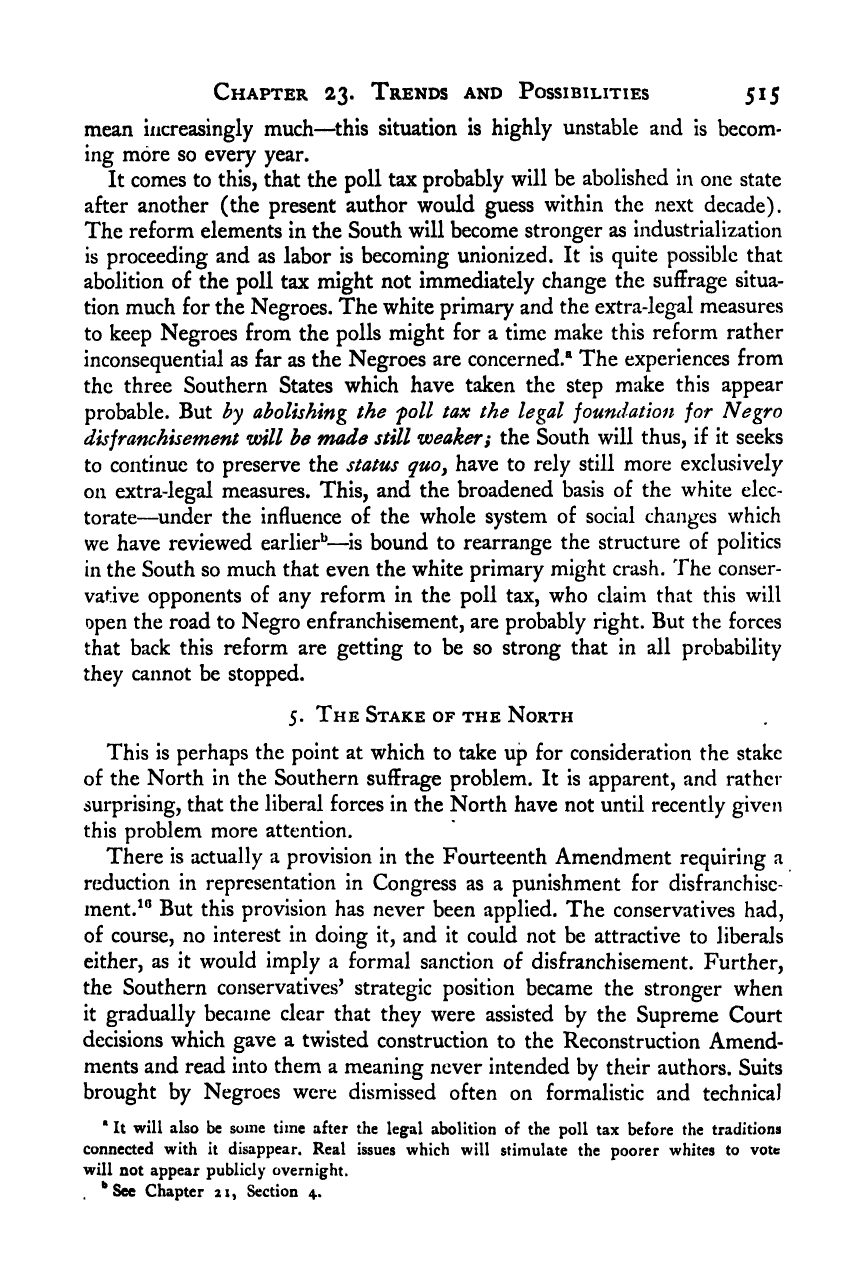Note: Gunnar Myrdal died in 1987, less than 70 years ago. Therefore, this work is protected by copyright, restricting your legal rights to reproduce it. However, you are welcome to view it on screen, as you do now. Read more about copyright.
Full resolution (TIFF) - On this page / på denna sida - V. Politics - 23. Trends and Possibilities - 4. An Unstable Situation - 5. The Stake of the North

<< prev. page << föreg. sida << >> nästa sida >> next page >>
Below is the raw OCR text
from the above scanned image.
Do you see an error? Proofread the page now!
Här nedan syns maskintolkade texten från faksimilbilden ovan.
Ser du något fel? Korrekturläs sidan nu!
This page has never been proofread. / Denna sida har aldrig korrekturlästs.
Chapter 23. Trends and Possibilities 515
mean increasingly much—^this situation is highly unstable and is becom-
ing more so every year.
It comes to this, that the poll tax probably will be abolished in one state
after another (the present author would guess within the next decade).
The reform elements in the South will become stronger as industrialization
is proceeding and as labor is becoming unionized. It is quite possible that
abolition of the poll tax might not immediately change the suffrage situa-
tion much for the Negroes. The white primary and the extra-legal measures
to keep Negroes from the polls might for a time make this reform rather
inconsequential as far as the Negroes are concerned.® The experiences from
the three Southern States which have taken the step make this appear
probable. But by abolishing the foil tax the legal foundation for Negro
disfranchisement will be made still weakery the South will thus, if it seeks
to continue to preserve the status quOy have to rely still more exclusively
on extra-legal measures. This, and the broadened basis of the white elec-
torate—^under the influence of the whole system of social changes which
we have reviewed earlier’^—is bound to rearrange the structure of politics
in the South so much that even the white primary might crash. The conser-
vative opponents of any reform in the poll tax, who claim that this will
open the road to Negro enfranchisement, are probably right. But the forces
that back this reform are getting to be so strong that in all probability
they cannot be stopped.
5. The Stake of the North
This is perhaps the point at which to take up for consideration the stake
of the North in the Southern suffrage problem. It is apparent, and rather
surprising, that the liberal forces in the North have not until recently given
this problem more attention.
There is actually a provision in the Fourteenth Amendment requiring a
reduction in representation in Congress as a punishment for disfranchise-
ment.^® But this provision has never been applied. The conservatives had,
of course, no interest in doing it, and it could not be attractive to liberals
either, as it would imply a formal sanction of disfranchisement. Further,
the Southern conservatives’ strategic position became the stronger when
it gradually became clear that they were assisted by the Supreme Court
decisions which gave a twisted construction to the Reconstruction Amend-
ments and read into them a meaning never intended by their authors. Suits
brought by Negroes were dismissed often on formalistic and technical
<< prev. page << föreg. sida << >> nästa sida >> next page >>